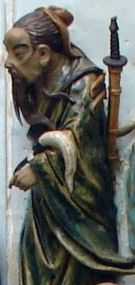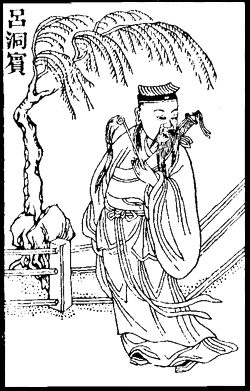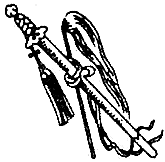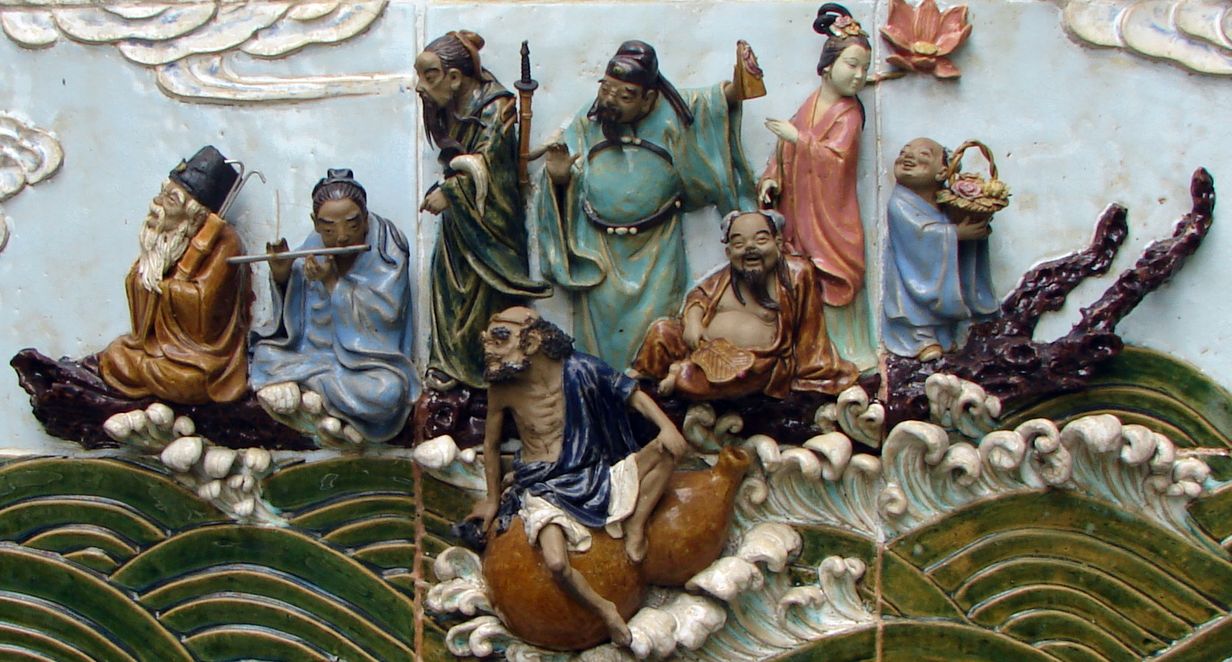
Content created: 2010-12-30
File last modified:
Go to previous or next story.

LǙ Yán 吕岩 = an unsuccessful student from a distinguished family, who eventually prefered to call himself Lǚ Chúnyáng 吕纯阳 (“Pure Light”) or Lǚ Dòngbīn 吕洞宾 (“Guest in the Grotto”)
The Fire Dragon Immortal (Huólóng Zhēnrén 火龙真人) = a Daoist, inclined to sow doubt
ZHŌNGLÍ Quán 钟离权 = another one (story 3)
Various tigers, beggars, maidens, ancient widows, and the occasional monster

In the year 755 in the Táng 唐 dynasty (period 12), a child named Lǚ Yán 吕岩 was born to a wealthy family. Some say he was born at Jīngzhào 京兆, which today is called Yǒnglè County 永乐县, Hézhōng District 河中府, in Shānxī 山西 Province.
His grandfather, LǙ Wèi 吕渭, had been head of the Ministry of Rites (Lǐbù Shìláng 礼部侍郎), and his father, Lǚ Yí 吕谊, had been the prefect (cìshǐ 刺史) of Hǎizhōu 海州, in Jiāngsū 江苏 Province. Naturally, his ambition was to become an official like them.
He was tall by the standard of the day, with a high nose and a wee mole over his left eyebrow. His complexion was very white, which he often complemented with a yellow robe and black belt. Handsome as he was, he had an unfortunate tendency to strut.
Unfortunately (and shamefully), he was unable to pass the necessary exams. When he was about twenty, having spent all his energy studying for exams, he was still unmarried after most of his companions had long since been wed.
(Some of his admirers deny that he failed his exams. They say that he did brilliantly, and even that he received the whole empire's highest academic degree when he was 12 and then held high offices until he was nearly 30. And many a work written by a later author has been falsely attributed to him in order to give it an aura of scholarship and authority.)
Discouraged, LǙ Yán made a journey to Lúzhōu 庐州 (Lú Shān 庐山), in Jiāngxī 江西 Province. There he met a Daoist who called himself the Fire Dragon Immortal (Huólóng Zhēnrén 火龙真人). The two men got on wonderfully, and the Fire Dragon Immortal gave Lǚ his first lessons in Daoist magic. But he left Lǚ Yán with a nagging doubt: Could the world of a Daoist alchemist and magician be more satisfying than the world of official power?
When he returned to Cháng’ān for examinations, Lǚ Yán stopped in a wine shop, where he encountered Zhōnglí Quán 钟离权, whom we met in story three. Zhōnglí Quán urged him to leave the world behind and study alchemy and perhaps attain the Way.
(The people who think Lǚ Yán had passed examinations at the age of 12 sometimes think Zhōnglí Quán disguised himself to become little Yán’s very Confucian childhood teacher. How could they think that?! Other people say Zhōnglí Quán had been Lǚ Yán’s Daoist master in a previous life and therefore had a special interest in his progress. Maybe.)
Although the Fire Dragon Immortal had infected him with the disease of doubt, Lǚ Yán had been raised, like modern youths, to understand that no human achievement was greater than doing well on examinations, so naturally he was skeptical about Zhōnglí Quán’s advice. But before he could think of a counterargument, he became very sleepy and lost consciousness.
He dreamt that he had passed the imperial exams and had been appointed to a very high office and was favored by fortune and admired by all. And this went on decade after decade. But suddenly a small slip offended the emperor, and he was sent into to exile, and his family was exterminated. Alone in the world, he could only weep.
Suddenly he awoke. He had slept only a few winks, so short a time that Zhōnglí was still heating his rice wine. Lǚ Yán was shaken to his very core. Suddenly convinced that worldly honors were in the end arbitrary and hollow, he was now ready to study the Way.
Or so he said. He was a bit drunk at the time, and Zhōnglí Quán doubted his sincerity, so he set him ten tests.
1. On the first occasion, Lǚ Yán returned home to find that all his family had suddenly taken sick and died. Unphased, he buried them all. Then suddenly they all came back to life. He didn’t think it a bit odd, and so he passed the first test.
2. On the second occasion, he went out to buy supplies. When the price had been agreed upon, the merchant suddenly reneged and gave him only half his change. But Lǚ Yán didn’t particularly care. And so he passed the test.

3. On the third occasion, as he went out early in the new year, a beggar asked for money. Lǚ Yán gave it to him. But rather than thanking him, the beggar scolded and railed at him. Lǚ Yán merely laughed and apologized. And so he passed the test.
4. On the fourth occasion, he was pasturing sheep in the mountains when a hungry tiger leapt forth. Lǚ Yán guided the sheep down the mountain, always standing between the tiger and the sheep. And so he passed the test.
5. On the fifth occasion, he was sitting in his room reading and a beautiful maiden appeared at the window and began flirting with him. He ignored her. She appeared again and again for three days, but he always ignored her. And so he passed the test.
6. On the sixth occasion, he returned home to find that all his possessions had been taken by thieves, even down to the food in the larder. He went out to tend his fields, and suddenly in the field turned up a hoard of gold. But he merely covered it over. And so he passed the test.
7. On the seventh occasion, he encountered a seller of bronze and brass and bought a small utensil. On returning home, he discovered it was actually made of gold. He rushed out to find the seller and returned it to him. And so he passed the test.
8. On the eighth occasion, a Daoist priest was selling medicine on the street. If you took one pill, he assured his listeners, you would die, but you would then become an immortal. Naturally, no one dared buy such a thing. Lǚ Yán bought a pill and ate it, but nothing happened. And so he passed the test.
9. On the ninth occasion, the river flooded, and Lǚ Yán was riding in a small boat with others. As they reached the middle of the river, the water became especially dangerous, and everyone was very frightened. But Lǚ Yán was unconcerned. And so he passed the test.
10. On the tenth occasion, he was sitting in his room peacefully reading when every sort of demon and monster came from the far corners of the earth to slay him, but he was not frightened in the least. One of the monsters said that in a previous life Lǚ Yán had wronged him and now needed to sacrifice his life. So Lǚ Yán drew a knife to kill himself. And so he passed the test.
When he had completed the tenth test, the monsters vanished and a great sigh was heard from heaven above. Zhōnglí Quán suddenly descended and congratulated him: “I set you ten temptations, and you were unmoved by any of them. You will surely attain the Way and become a very great Daoist.”
And so it happened that Lǚ Yán followed Zhōnglí Quán to the Hèlíng 鹤岭 Mountains at Zhōng Shān 终山 in Shǎanxī 陕西, where he was initiated into the world of Daoist magic. Here he also came to call himself Chúnyáng 纯阳 (“Pure Light”) and Dòngbīn 洞宾 (“Guest in the Grotto,” the name most widely used for him today). And he promised Zhōnglí Quán that he would do all in his power to bring suffering humanity to a proper understanding of the Way.
Lǚ Dòngbīn was delighted when once again he met the Fire Dragon Immortal, who this time gave Lǚ a magical sword named zhǎn yāoguài 斩妖怪, “the devil-slayer,” and taught him how to wield it to slay monsters, and in particular a flood dragon that happened to be making sport at the time. Here are three stories to show how he helped us:
1. When he had mastered more magic, Lǚ traveled to the town of Yuèyáng 岳阳 disguised as an oil-seller, hoping to convert all those who were not selfish to study the Way. His test was to give them only the oil that they paid for and to see who asked for more. Sadly, for a whole year everyone he met tried to wheedle more oil than he paid for. The single exception was a very poor old lady, who not only was satisfied with her proper due, but invited him to her house for wine. So he went to visit her. On his visit, he threw a few grains of rice into her well, which turned the whole well into excellent wine, which she was able to sell, so that, although often a bit tipsy, she was no longer poor.
One day Lǚ Dòngbīn returned to the old lady’s house. She was not at home, but he asked her son how the wine business was going. “Well enough,” the boy replied. “The trouble is that this way there is no left-over mash for the pigs.” Lǚ Dòngbīn was disgusted at this ingratitude. So he extracted the grains of rice he had thrown into the well, and went on his way, leaving mother and son much sobered.
2. On another occasion Lǚ Dòngbīn went drinking at a wine shop. But he refused to pay the owner. After some heated discussion, he agreed to paint two magnificent dancing cranes on the wall. These became so popular that customers flocked to the shop to see them, most of them buying wine, and the merchant more than made up for his loss from Lǚ Dòngbīn’s refusal to pay him.
But the merchant was greedy and sought to use the cranes to bring in more and more customers. Of course, the cranes had never been meant to feed his greed, but only to pay his just bill. And so suddenly one day the painted cranes flew away. And without the painted crains, the wine shop was no more interesting than it had been before, and the owner had to be satisfied with what he earned through his own efforts.
3. Lǚ Dòngbīn wanted to experience all the feelings of humanity so that he could be a better teacher in leading us to the Way. And so he had himself beheaded to learn what it felt like. "The knife fell like wind passing the ear; after the time it would take a fleet horse to run thirty li, he knew being beheaded was like boiling oil poured upon the heart." (Popper 1935: p. 354.5)

One of the most famous disciples of Lǚ Dòngbīn was a certain LIÚ Hǎichán 刘海蟾, who is always shown carrying a string of coins and a three-legged toad, but his story would take us far afield. If you like wandering far afield and therefore want to know the story anyway, click here.
When artists in later ages have represented Lǚ Dòngbīn, they have portrayed him in scholar’s robes, with his magical sword, and with a Daoist fly whisk or yúnzhǒu 云帚 (“cloud-sweeper") made of horse hair, which can be used to work magic and which symbolizes a Daoist’s ability to fly. Because artists always show his sword, he is the patron saint of barbers, but he is widely worshipped by magicians and alchemists and others who concern themselves with the magical arts or the mysteries of the universe. When temples are erected to him, he is often referred to as the Imperial Lord of Trustworthy Protection (Fúyòu Dìjūn 孚佑帝君). He appears in several popular proverbs or expressions. (Link)
(In the introduction we noted that Lǚ Dòngbīn was the only one of the Eight to have a strong independent cult. Click here for the bibliographic reference to an interesting scholarly article about him.)

Return to top
Go to
previous or next story.